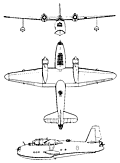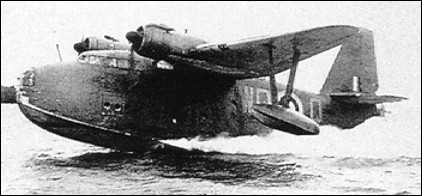|
| The twin-engine Saṛ Lerwick was an
attractive and compact design intended
to meet a medium-range maritime
reconnaissance requirement,
Specification R. 1/36, but was a total failure,
First flown before the end of ̀938,
the prototype featured twin fins and.
rudders but from the outset was found
to be seriously lacking m lateral stability,
and displayed a determination to
roll and yaw in cruising flight, making
the aircraft impossible to fly 'hands off,
a damning indictment for a maritime
patrol aircraft. In due course a single
fin and rudder was fitted, but not until
this was considerably enlarged was
any improvement in the handling characteristics
discernible. Starting with
the seventh production example, wing
incidence was increased and enlarged
propellers fitted to the Hercules
II radiais, but the latter were
found unsuitable for operating on
rough water. Moreover, stalling tests
showed the Lerwick to have vicious
traits, the stall under alighting conditions
being accompanied by sharp
wing-drop. Nevertheless 21 examples
were produced and the Lerwick was
first delivered for service with No, 209
Squadron m December 1939 at Oban,
but after the type had flown a small
number of semi-operational patrols it
was decided to abandon further efforts
to rectify its problems. The last eight
aircraft were powered by Hercules
IVs and the final example was completed
m November 1940; one aircraft
was flown by No, 240 Squadron but was
lost on 20 February of that year, and
some flew with No. 4 Operational
Training Unit at Invergordon.
 | A three-view drawing (648 x 882) |
| GrahamClayton, e-mail, 25.04.2023 09:07 Of the 21 Lerwicks ever built, nearly half of them (10) were lost in accidents. reply | | ribbit, e-mail, 25.02.2022 05:11 "an attractive and compact design"
Who wrote this? On what basis did they arrive at this ludicrous assertion? reply | | Barry, 12.04.2016 12:46 Reallocated to R.C.A.F. squadrons Nos. 422 and 423 for operational training on Loch Erne in the summer of 1942 at the end of that year they were declared obsolete and early in 1943 they were scrapped. Lord knows what the Canadians thought of them!
Span 80'10" Length 63'7 1 /2" Height 20'0" Wing area 845 sq ft. Loaded weight 28,400 lb Maximum take off weight 33,200 lb
Maximum speed 214 mph Cruising speed 166 mph
Range 1,540 miles Service ceiling 14,000 ft.
Armament 1 x .303" Vickers 'K' gun in bow turret
2 x .303" Browning in dorsal turret and 4 x .303" Browning in tail turret. 2000 lb bombs or depth charges. reply | | John B., e-mail, 18.12.2014 22:17 The rear fuselage is too short so the tail surfaces do not exert enough leverage. reply | |
| | gez wood, e-mail, 20.05.2014 21:18 Interesting article - may not have been many of the Lerwick in service but they still made a Bakelite recognition model - I bought one at the weekend! reply |
| VinceReeves, 05.03.2013 21:21 Quite an achievement to produce an aeroplane that was hopeless on every parameter of performance, really. reply | | Klaatu, e-mail, 23.06.2011 17:23 During World War II the U.S. offered to supply the RAF with Martin PBM Mariner flying boats. Although the PBM proved to be a very successful aircraft the RAF, for reasons that nave never been entirely clear, ultimately rejected them. I can't help wondering whether the fact that the Mariner bore a superficial resemblance to the unfortunate Lerwick may have had something to do with that. reply | | Leo Rudnicki, e-mail, 08.08.2009 06:59 It was too much of an embarassment for the Air Ministry to admit that a large segment of their maritime patrol requirements relied on one aircraft that failed to run on water and failed to fly. American Liberators and Catalinas would fill the void eventually. See also the Blackburn Botha. reply | | JK, e-mail, 07.08.2009 20:30 As an minded school boy throughout WW 2, I read all the available literature but could never find performance figures for the "Flying Pig". It was always "Not released". It is interesting that you provide nio figures either.
Another aircraft whose performance was kept secret throughout WW 2 was the Westland Whirlwind. reply |
|
Do you have any comments?
|
| 
COMPANY
PROFILE
All the World's Rotorcraft
|



 gez wood
gez wood




Hi, Can I ask how much you paid for the model, or what is it worth now? Thank you
reply